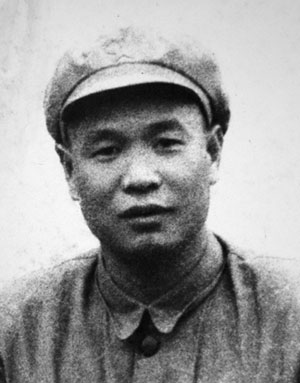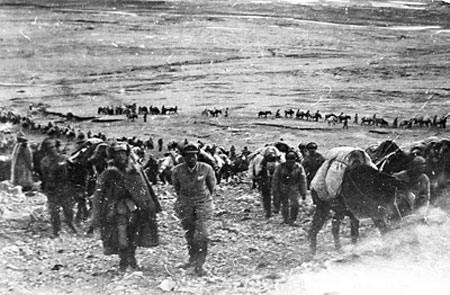
Photo shows Fan Ming before setting off for Tibet in 1951, photo from Photo Gallery.
Fifty-eight years ago, he led an army to march into Tibet and forged a profound friendship with the 10th Panchen Lama.
The veteran soldier is Fan Ming, 95. Fan whose name Ming was given by Chairman Mao Zedong has witnessed the history of Tibet's peaceful liberation and earned legendary titles such as "Founding General of China" and "Representative to the Panchen Lama's Headquaters."
Dangers and difficulties during march into Tibet
Blizzard, flood, earthquake, food shortage ... It is hard for people today to imagine how tough the march into Tibet was.
Following the signing of the 17-Aticle Agreement on May 23, 1951, the Central Government ordered the 18th Army of the PLA (People's Liberation Army) to march into Tibet by four routes.

Photo shows Fan Ming and his Independent Division of the PLA 18th Army on the way to Tibet in 1951, photo from Photo Gallery.
The northwest route was to be taken by "the Independent Division of the 18th Army." The army started its march on Aug. 22 from Qinghai Province, first by crossing the turbulent Tongtian River and climbing the Tanglha Mountain with an altitude of 6,839 m above sea level.
August was usually the best season on the Qinghai-Tibet Plateau for military actions. At the beginning, the troops were all in high spirits. But only a few days later, "songs disappeared," and horses could hardly walk further, let alone men. At the foot of Mt. Nuomugang at the height of 5,200 m, soldiers had to rest for a long while after taking only a few steps due to the strong altitude sickness.
Breathless like others, though, Fan Ming, as the division's commander, took the initiative in singing the Shaanxi Opera in order to encourage his men.
Having gone through the mountains, they approached marshes, which claimed lives of 20 soldiers and 400 cattle on their way.
Later, having blocked by the suddenly rising Tongtian River for half a month resulting from a snowstorm and facing with food shortage, the army had to ask the Northwest Office of the Chinese Communist Party for an air delivery of foodstuffs after eight soldiers lost their lives when crossing the river.
But it was by no means easy to make airdrops at "the Roof of the World." "If the river is too turbulent to cross, you army stop marching into Tibet and prepare for returning," the superior replied.
